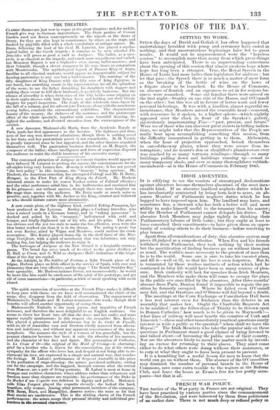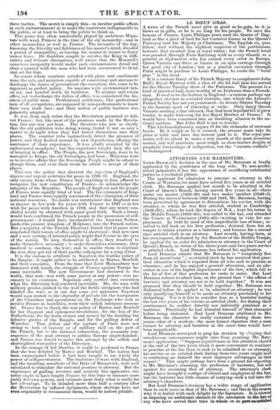FRENCH WAR POLICY.
THE tactics of the War party in France are not original. They have been practised by various parties since the commencement of the Revolution, and were borrowed by them from politicians of an earlier date. There is not much deep or refined policy in
these tactics. The secret is simply this—to involve public affairs in such embarrassment as to make the contrivers indispensable to the public, or at least to bring the public to think so.
This game was often successfully played by ambitious Minis- ters 'with weak Princes in the time of the old monarchy—and in other monarchies as well as France. The favourite of the day-, knowing the frivolity and fickleness of his master's mind, dreaded a period of tranquillity, as leaving his master at leisure to fancy newer faces. He therefore sought to involve the King in diffi- culties and delicate discussions well aware that the Monarch's conscious incapacity would under such circumstances dread and shun a quarrel with the man who had been accustomed to think and act for him.
-In courts where courtiers satisfied with place and emolument were the rule, and ministers capable of conceiving and anxious to discharge the duties of government the exception, this came to be regarded as perfect policy. Its maxims were systematized into an art, and handed down by tradition. To acquire and retain office, not to discharge the duties of office, was considered the bu- siness of public men. Professional politicians, like professional men of all occupations, are supposed by non-professionals to know their own trade best ; and their notion of public business was generally adopted.
It was from such rulers that the Revolution promised to deli- ver France : but, like most of the promises made by the Revolu- tion, this one was not kept. The theorists who saw so clearly that the old publicists were doing wrong, found it not so easy a matter to do right when they had forced themselves into their places. The courtier tribe instinctively detect the presence of power, and they flocked around its new depositaries, offering the assistance of their experience. It was gladly accepted by the embarrassed neophytes ; but this experience taught only the art of keeping in office. The People, the new Sovereign, were to be managed as Kings, the old Sovereigns, had been : Ministers were so to involve affairs that the Sovereign People might be afraid to change them, and even their rivals be afraid to accept of their places.
This was the policy that dictated the rejection of England's sincere and urgent overtures for peace in 1796-97. England, the only enemy from whom France had anything to fear, offered to recognize the new constitution of France—to acknowledge the integrity of the Republic. The people of England and the people of France were equally tired of war. The Governments of Eng- land and France were equally convinced of the exhaustion of their national resources. No doubt was entertained that England was as sincere in her wish for peace with France in 1797 as in her wish for peace with America in 1783, and that any treaty con- cluded would be observed with equal good faith. Such a treaty would have confirmed the French people in the possession of self- government : it would have incorporated the Austrian Nether- lands (the present kingdom of Belgium) into the French nation. But a majority of the French Directory feared that if peace were concluded their tenure of office might be shortened—that new men and'a new system of internal policy might find favour in the eyes of the nation. To keep themselves in office, they resolved to make themselves necessary ; to make themselves necessary, they resolved to continue the war ; and to enable them to continue the war, they got rid of their pacific colleagues by a coup d'etat.
It is the custom to attribute to Napoleon the warlike policy of the Empire : it ought rather to be attributed to Barras, Rewbell, and their associates. From the time that Lord Malmesbury was dismissed with insult, the struggle of France against Europe be- came inevitable. The new Government had declared to the world, that war—war with some power or any power—was ne- cessary to its existence. Napoleon only carried into execution what the Directory had rendered inevitable. He, the man with military genius, pushed to the wall the feeble intriguers who had kindled the war ; as in our day- some yet unknown Napoleon would soon restore to the obscurity of private life the war-praters of the Chambers and speculators on the Exchange who seek to involve France in hostilities, were their selfish intrigues success- ful. France has to thank the war policy of Barras and Rewbell for her frequent and ephemeral revolutions, for the loss of the Netherlands, for the drain of men and money by the dazzling but delusive glories of the Empire, and for the galling defeat of Waterloo. That defeat and the capture of Paris were not owing to lack of bravery or of military skill on the part of the French, but to the national exhaustion, the necessary con- sequence of the mad attempt to subdue Europe single-handed ; and France was forced to make this attempt by the selfish and shortsighted war-policy of the Directory.
In the nonage of her liberties, it could be pardoned to France that she was deluded by Berms and Rewbell. The nation had been emancipated before it had been taught to use wisely the power of self-government. The traditions of wars with England, and the insulting manifesto of the Duke of Brunswick, were well calculated to stimulate the national passions to phrensy. But the experience of galling reverses and scarcely less oppressive vic- tories ought to have taught France by this time to measure more justly her own powers, and estimate more truly what is really for her advantage. To be deluded more than half a century after the Revolution by inflated declaimers, whose orations have not even .originality to recommend them, would be indeed pitiable.



























 Previous page
Previous page